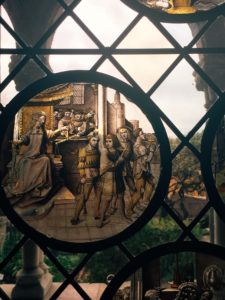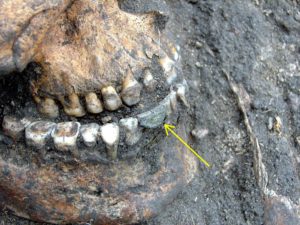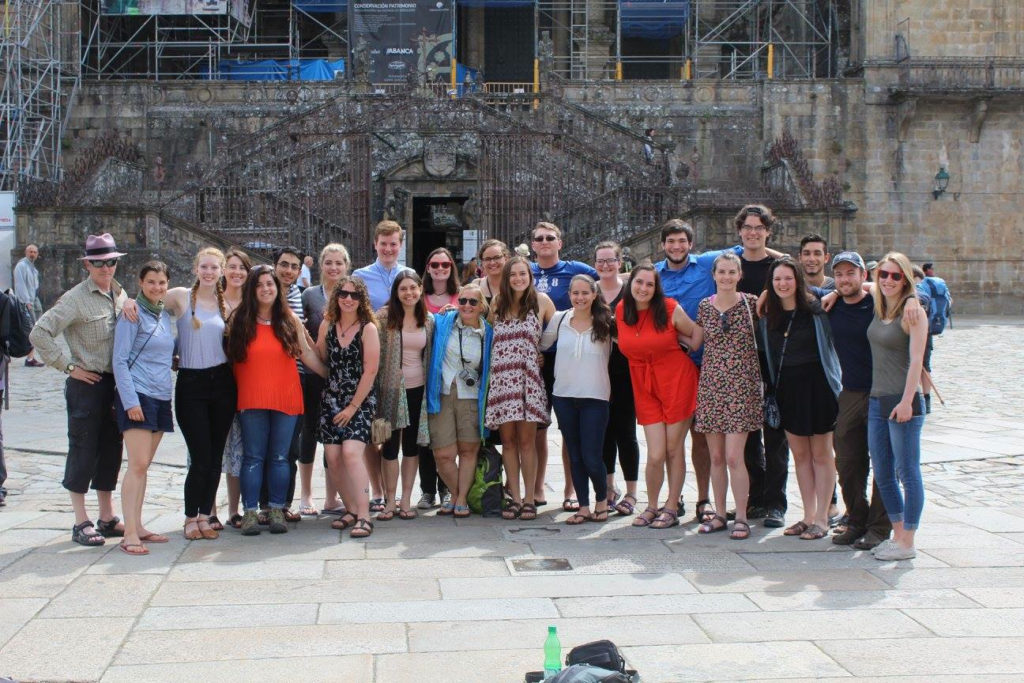Stephen Lecesse, PhD candidate and head of HGSA, has given us the inside scoop on the events that HGSA has organized this semester and what’s coming up in the Spring! Read Below:
Tag Archives: Rachel Podd
HGSA Fall and Spring Events
Comments Off on HGSA Fall and Spring Events
Filed under Department Events, Events, Grad Student News, Uncategorized
Postcard from Spain… PhD candidate Rachel Podd reports on her research.
We’re happy to hear from Rachel Podd in this postcard she sent about her research in Spain this Summer. Rachel is a Ph.D candidate in the History department and helps lead undergraduates on el Camino de Santiago every spring. This summer she stayed after walking the camino to work on her own research. Rachel writes:
Comments Off on Postcard from Spain… PhD candidate Rachel Podd reports on her research.
Filed under Grad Student News, Postcards, Uncategorized
Medieval England Conference Recap
 On April 24th and 25th, the History Department sponsored the Medieval England Conference that showcased the research done in the Graduate ProSeminar Course led by Dr. Maryanne Kowaleski. This conference included papers by members of the History Department, as well as the Center for Medieval Studies. Patrick DeBrosse, Rachel Podd, Amanda Racine, and Ron Braasch were the 3 doctoral and master’s students, respectively, that presented their research. See a list of all the presentations, as well as some pictures, below. Continue reading
On April 24th and 25th, the History Department sponsored the Medieval England Conference that showcased the research done in the Graduate ProSeminar Course led by Dr. Maryanne Kowaleski. This conference included papers by members of the History Department, as well as the Center for Medieval Studies. Patrick DeBrosse, Rachel Podd, Amanda Racine, and Ron Braasch were the 3 doctoral and master’s students, respectively, that presented their research. See a list of all the presentations, as well as some pictures, below. Continue reading
Comments Off on Medieval England Conference Recap
Filed under Department Events, Grad Student News
Postcard from Rachel Podd, Digging Up Medieval Bones in Poland
The History Department received this great postcard from PhD student Rachel Podd, who spent part of the summer at archaeology field school. Here’s what she had to say:
Note: For ethical and legal reasons, I cannot post photographs of the human remains excavated during this summer. Accordingly, the photographs within this blog post are from the Giecz website.
Over the course of three weeks in July, due in part to generous grants from Fordham, I was able to take part in an archaeological dig and field school run by Ohio State University in Giecz (pronounced “Getch”), Poland. Though modern Giecz is quite small, with a population of around 150 people and an hour walk to the nearest train station, it was once a center of profound political importance to the Piast dynasty, the first historical dynasty of Poland. In 966, Prince Mieszko I was baptized as a Christian, possibly at Ostrów Lednicki, and accordingly, the Piast stronghold at Giecz, which was likely constructed during the eighth century was expanded to include a chapel, though construction was never completed. Continue reading
Comments Off on Postcard from Rachel Podd, Digging Up Medieval Bones in Poland
Filed under Grad Student News, Postcards
Summer Postcards: Our Camino

History PhD students Louisa Foroughi (left) and Rachel Podd help to lead the Annual Fordham Camino de Santiago trip
Fordham History graduate students Louisa Foroughi and Rachel Podd were delighted to serve as chaperones accompanying the Camino study tour led by Fordham History Professor David Myers and Dr. Alex Egler of Fordham’s Religious Education Program. The Camino de Santiago is a medieval pilgrimage route dating back to approximately the ninth century, when the body of St. James was discovered near the sea by a monk led there by divine inspiration. Almost immediately, pilgrims flocked to the shrine of the saint, and over the course of the high and late middle ages men and women, nobles and paupers, kings and queens traveled routes all the way from England, Paris, Northern Africa, Constantinople, and Rome. Today the most famous route begins in St. Jean-Pied-de-Port, at the border between France and Spain, and cuts through the Pyrenees, across the flatlands of Castille and Leon, and into mountainous Galicia, to the Cathedral of St. James in Santiago de Compostela. The Fordham Camino program begins in Leon, halfway through this route, and lasts two weeks, from mid-May to early June, during which time 23 students walked 311 km together with their fearless leaders. Rachel and Louisa had an amazing time walking the road, instructing students in the finer details of medieval art and history, and bandaging blisters. Particular highlights include the 12th century Romanesque church in Rabanal, the fog over the mountains just past the Cruz de Ferro, and unbelievable pulpo in Melide. To learn more about this year’s Camino tour, see the course blog at Mapping the Camino. Buen Camino!
Comments Off on Summer Postcards: Our Camino
Filed under Grad Student News, Postcards
Meet the Winners of the Loomie Prize for 2015
Each year the History department awards its highest honor for excellence in graduate scholarship, the Loomie Prize. The Loomie prize is awarded to the best seminar paper produced during the previous academic year. All M.A. and Ph.D. students who have taken the proseminar/seminar sequence or a research tutorial are eligible. The prize for 2015 was awarded to Rachel Podd and Christine Kelly.
Rachel Podd‘s paper “Interrogating the Guaridoras: Women, Medicine and Magic in Catalonia before the Plague” was written under supervision of Alex Novikoff. The Loomie judges noted that it was based on rich source material, and offered a convincing argument about why and how these sources could be useful to scholars beyond those who specialize in 14th century Catalonia. Rachel wrote that “these documents offer a window… into a vibrant and dynamic world. Within them, one may find Saracens and Christians, men and women, as well as spells and incantations for the health of people and of animals. Through close reading and contextualization, they can elucidate the lives of individuals performing curative activities outside of the major civic centers of Catalonia before the arrival of the plague – what types of diseases did they treat, and how? If caught, what punishment could they expect from the ecclesiastical judicial structure?” Hence, Rachel demonstrated how these records sit at the juncture of vernacular medicine, episcopal control, and inquisition.
Christine Kelly‘s paper “Gender, the Popular Front, and the Folksong Revival through Sing Out! Magazine, 1950 – 1968″ written under supervision of Kirsten Swinth. Her essay is an outstanding example of cultural analysis built from the gritty work of data collecting. By categorizing hundreds of articles in the folk music periodical, Sing Out!, Christine developed a highly original thesis about the discourse of gender in the 1960s folk music revival. She overturned a conventional division between the leftist cultural movements of the 1930s, and those of the 1960s, showing that folk revivalists in the 1960s resurrected familiar tropes and narratives of gender from the 1930s. These were ultimately highly traditionalist, premising an anti-capitalist utopia on an idealized view of the American past where women remained tied to “traditional domestic and reproductive spaces” and “men were more responsible for carrying out the daily operations of political thought and cultural innovation that constituted the engine [of the] folk song revival.”
We reached out to Rachel and Christine for details about their work and how they developed the ideas and research for their papers.
Comments Off on Meet the Winners of the Loomie Prize for 2015
Filed under Grad Student News, Student Awards



